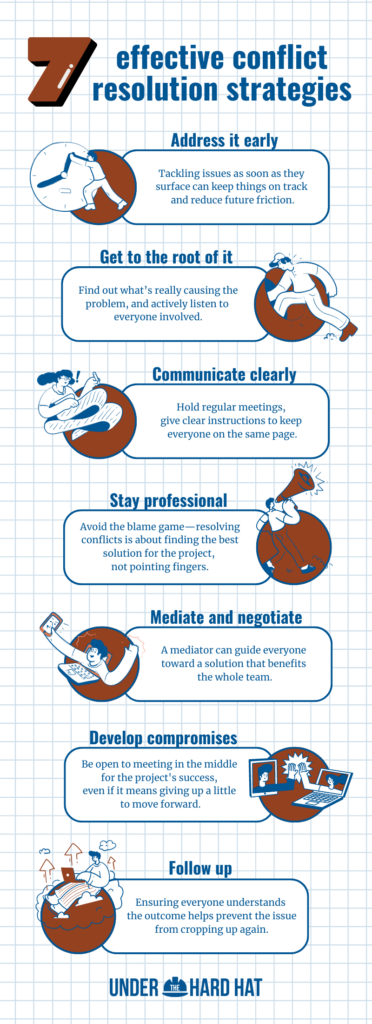Conflicts on construction sites are almost inevitable. With so many people involved—contractors, subcontractors, architects, and laborers—disagreements happen. If not addressed quickly, these conflicts can disrupt productivity, safety, and project timelines, potentially costing time and money.
Handling conflict effectively is crucial to creating a safe and productive environment. Managing disputes effectively keeps things on track and strengthens teamwork. However, ignoring issues or letting emotions run high can turn minor disagreements into significant setbacks, affecting the entire project. That’s why knowing how to resolve conflicts is essential for every construction team.
Common sources of conflict
Construction sites are bustling places with lots of moving parts, so it’s no surprise that conflicts can crop up. Here are the most common trouble spots:
- Communication breakdowns: Clear communication is critical to ensure messages are misunderstood. Poor communication can quickly lead to errors and disputes, whether it’s a vague instruction, a missed email, or a language barrier. If everyone isn’t on the same page, minor misunderstandings can snowball into big issues.
- Resource allocation: Materials, equipment, and labor are often in high demand on a construction site. Disagreements over who gets what, when, and how much can cause tension. If one team holds up equipment that another needs, it disrupts schedules and productivity.
- Scheduling issues: Construction projects live and die by their schedules. Weather delays, supply chain hiccups, or unexpected complications can push back deadlines, leading to friction between teams. When different groups have conflicting timelines, it’s a recipe for frustration.
- Contractual disputes: Contracts outline how a project should be completed but can also be a source of conflict. Differing interpretations of contract terms, scope changes, or unmet obligations can cause disputes. Even with straightforward contracts, conflicts can still arise if expectations aren’t met.
- Safety concerns: Safety is non-negotiable. Conflicts can occur when there are differing opinions on safety protocols or someone isn’t following them properly. Addressing these disagreements quickly is crucial, as they directly impact everyone’s well-being.
- Personal differences: Clashing personalities, different work styles, or the stress of a high-pressure environment can lead to conflict. These may seem minor but can escalate if not managed properly.
Effective conflict resolution strategies
When conflicts do arise, addressing them promptly can prevent them from escalating. Here are some go-to strategies:
1. Address it early
The longer a conflict lingers, the bigger it can become. Tackling issues as soon as they surface can keep things on track and reduce future friction.
2. Get to the root of it
Find out what’s really causing the problem. Conflicts often come from miscommunication or differing expectations. Actively listen to everyone involved; understanding their concerns can lead to a more amicable solution.
3. Communicate clearly and effectively
Open lines of communication are essential. To keep everyone on the same page, hold regular meetings, give clear instructions, and use project management software. Documenting agreements and changes also helps prevent misunderstandings.
4. Stay professional
Getting emotional during disagreements is easy, but staying focused on the facts is essential. Avoid the blame game—resolving conflicts is about finding the best solution for the project, not pointing fingers.
5. Mediate and negotiate
Sometimes, a neutral third party is needed to help find common ground. A mediator can facilitate balanced discussions, guiding everyone toward a solution that benefits the whole team.
6. Develop compromises
Conflict resolution often requires compromise. Be open to meeting in the middle for the project’s success, even if it means giving up a little to move forward.
7. Follow up
After reaching a resolution, ensure everyone understands the outcome and their roles. Following up reinforces the solution and helps prevent the issue from cropping up again.

Proactive measures to prevent conflicts
The best way to handle conflict is to prevent it from happening in the first place. Here’s how to keep potential disputes at bay:
Regular meetings: Frequent check-ins allow everyone to discuss progress, raise concerns, and address potential issues. They help prevent misunderstandings and keep communication open among all parties.
Conflict resolution training: Equip site managers and supervisors with conflict resolution skills. Training helps them spot early signs of tension and address issues before they escalate. It also provides them with de-escalation techniques, which are crucial in a high-pressure environment like construction.
Create clear policies: Establish clear policies and procedures for conflict resolution so everyone knows how to handle disputes. Outline steps for raising concerns, mediation processes, and how final decisions will be communicated.
Foster a positive work environment: Promote respect, teamwork, and inclusivity to reduce conflicts. Encourage a culture where everyone’s input is valued and differing opinions are seen as opportunities for improvement, not sources of friction.
The benefits of effective conflict management
Effective conflict management on construction sites has some great benefits. Resolving issues quickly and fairly helps everyone focus on their work. When team members feel heard and valued, morale increases and that positivity boost leads to better productivity.
It also makes a big difference in safety. Addressing safety-related concerns immediately creates a secure environment. When workers know their concerns are taken seriously, trust and cooperation are built, making the whole site feel like a team effort.
Plus, effective conflict management is a game-changer for project success. By tackling problems early and proactively, you can avoid costly delays and keep things running on schedule and within budget. When everyone works toward the same goals, misunderstandings and mistakes are less likely to derail the project.
Bottom line
Conflict resolution is crucial on construction sites, where disagreements can disrupt productivity and safety. By tackling conflicts early and effectively, you can maintain a productive, safe, and positive environment. Proactive measures like regular meetings, conflict resolution training, and clear policies help prevent issues before they arise.
Conflict resolution fosters teamwork, boosts morale, and ensures projects are completed on time and within budget. Effective conflict management isn’t just about solving problems—it’s about creating the conditions for success.


